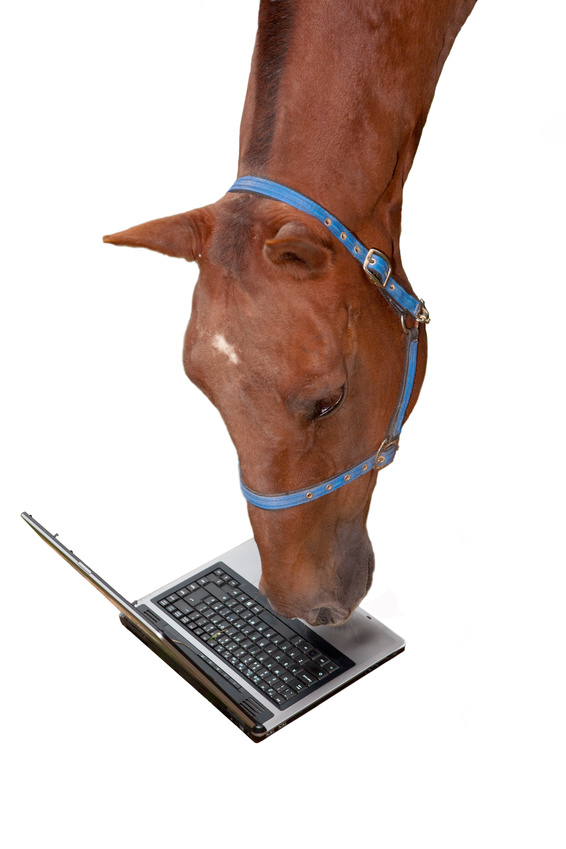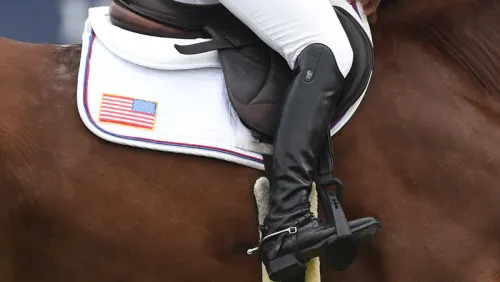I’ve handed over the reins of my column to a trusted friend, Mr. Paul Mahalick. Paul served as the office manager on my farm for many years, gaining first hand practical knowledge of day-to-day operations of a show jumping stable and more importantly, teaching me the value of office management and all it entails to a small business. “Out of sight, out of mind” is a common problem with office work, but the tasks involved are every bit as important to a successful stable as mucking stalls and exercising horses. Paul was also a member of the team that produced the Syracuse Invitational Sporthorse Tournament, as the treasurer and a Board of Directors member.
I now understand the significance of excellence in the office, but when Paul joined my organization, it was clear this was an area of weakness for John Madden Sales. This improved immensely under his direction, resulting in less stress every tax season and a clear picture at a moment’s notice of how my business was doing, not just in the ring, but outside of it as well. I think many professionals struggle with this area and while it may seem unnecessary to seek outside counsel, it may not only be a smart move, but also be crucial to the long term success of your business.
-John E. Madden
Owning and operating an equine business in the sport of show jumping is a dynamic, global and creative endeavor. Achieving excellence in the ring is always the goal, and efforts toward that endeavor are directed most of the time toward the training and development of students and horses.
But often the financial operations are left to run on auto-pilot. In other words, many small businesses in our sport are so heavily focused on winning in competition that they fail to identify potential shortfalls behind the scenes in business practices. A few of these shortfalls and respective solutions are as follows:
Record Keeping
In my profession, I see a spectrum of small businesses, and often they struggle with keeping good accounting or financial records for their business operations. Good record keeping has many advantages including monitoring the progress of the business, preparing solid financial statements, and having data available for accurate tax returns. In addition, having records that are easily accessible and organized helps the efficiency of the entire business operation.
Vendors, customers and equine professionals, such as veterinarians and farriers, all appreciate an organized business. They can easily identify a business that isn’t organized when they experience delays or can’t obtain clear answers to questions. The financial rewards of good record keeping far outweigh the costs and will avoid “re-creating the wheel” when it comes time to prepare financial statements and tax returns.

No matter how good you are at training horses, you still need educated office help to run a successful horse business. Photo by Kerioak/Fotolia.com
Simply put, being organized on an ongoing basis is much easier and less costly than an end-of-the-year rush to account for months of transactions retrospectively. Also, diligent and accurate record keeping is important during a tax audit as accurate records are crucial in supporting tax positions.
Experience And Education Count
ADVERTISEMENT
Employing a competent internal bookkeeper who fundamentally understands our sport and who has good accounting skills and knowledge of accounting software, such as QuickBooks, is essential.
A problem that accountants see quite often is business owners or key management undervaluing the importance of a bookkeeper’s role and subsequently placing an unqualified person in the bookkeeper’s position. This is simply disastrous from an accountant’s point of view. Would you hire someone who doesn’t know anything about horses to train you in the ring? I think not!
When obtaining the year-end accounting files from a client, it’s immediately apparent if the records are in good order. If they aren’t, the records in the accounting software become a landfill of meaningless information. Paying for quality bookkeeping up front will help you avoid paying a second time for an accountant to obtain and compile accurate data from the books for annual financial statements and tax reporting.
Use The Right Tools For The Job
Today we’re lucky to have efficient and user-friendly accounting software for any small business. Two popular accounting software programs include QuickBooks and Peachtree. Both software packages aid in organizing, tracking and summarizing business transactions and records, which is vital in the equine industry. With a good in-house accountant employed, a business will avoid the “garbage in, garbage out” pitfall.
In other words, good software is only as good as the person using it. QuickBooks advertises: “If you can write a check, you can use QuickBooks.” While this is true, it doesn’t mean the accounting will be correct unless someone with the knowledge to accurately process records and account for them correctly in the software is operating the software.
Once accounting systems are set up and correctly in place, it’s easy to generate meaningful financial statements, and the tax preparation process becomes streamlined and efficient. The benefits of excellent accounting and reporting systems are tangible when reports can be obtained quickly.
Cold Hard Cash
At the end of a day, month or year, every business must look to their cash position. Effective cash flow management is comprehensive in nature because farm and ranch owners need to look at cash for the funding of operations, as well as for paying any applicable foreign and domestic taxes based on business profits. Accordingly, have your accountant help you with your cash flow and tax projections. As for taxes, who wants an April 15th tax surprise? Planning is key!
Map out a cash plan for the next year and keep your eye on the next five and 10 years as well. Surprise expenses will be minimized through proper planning and foresight. Ignoring the planning aspect in a business puts an uncertain cloud over the potential success of business operations. If no one is “minding the store,” things will inevitably happen that negatively affect cash flow.
ADVERTISEMENT
Manage Your Risk
Let’s face reality. Businesses operate in a world of many unknowns, and show jumping has some unique inherent risks due to the nature of training and competing. Continuous evaluation of risk and how it applies to the various components of any business can be daunting.
Identifying, assessing and prioritizing risks are important to mitigate loss in any business. After identifying risks, assessing potential loss, and prioritizing risks from greatest to least, focus on those risks that will have the greatest impact on your business.
In order to protect your assets, as well as your reputation, from the greatest exposures in your operation, proper insurance must be considered. Insurance is a great vehicle for offsetting risk, but you should take care to avoid being over insured. This isn’t prudent or cost effective. Transferring risk to others, personally accepting risk, or avoiding risk are all valid options.
The value from risk management not only helps the business owner sleep well at night, but it also minimizes the impact of potential serious problems. Discussions with insurance professionals can be a great tool in the assessment and protection from business risks.
Get All Your Ducks In A Row
Schooling in your business office is just as important as schooling in the ring. At the end of each year, equine entrepreneurs desire a financial profit and want to know what’s left in their “pockets.”
Proper record keeping, hiring competent accounting personnel, purchasing good accounting software, effective cash flow and tax planning, and minimizing risk are crucial to maximize profits and avoid unintended financial surprises. Keeping these points at the forefront of your thinking will enhance the profit to your business.
To win in our sport we acquire the best horses and hire the best trainers and veterinarians. So why not employ and secure best practices when it comes to managing your behind-the-scene financial business operations?
M. Paul Mahalick, MBA, CPA, is a tax manager at Green & Seifter CPAs and has more than 15 years of public accounting experience. His industry experience includes international taxation of individual athletes and corporations, horse farms, telecommunications, oil, real estate, bankruptcy and entity restructuring, as well as expertise in international and multi-state individual and corporate income taxation.















